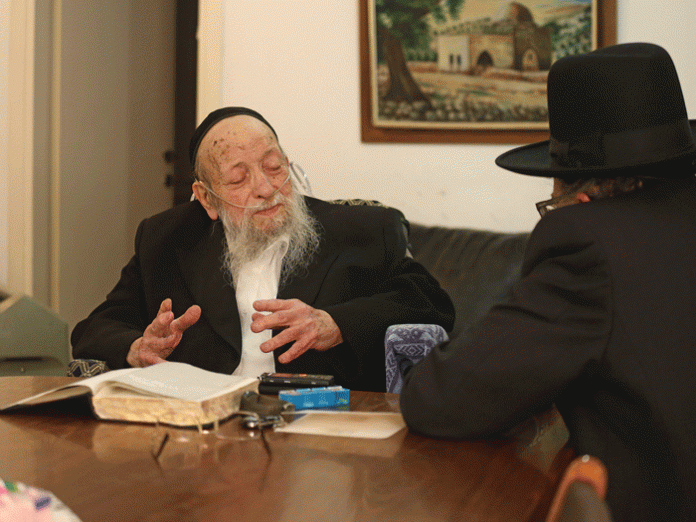It is widely accepted that Rav Meir Chodosh, zt”l, was one of the luminaries of the mussar movement, as well as one of the most revered mashgichim of the previous generation. Born on 27 Shevat 5658 (1898) in the Lithuanian city of Paritch to Rav Ben Tzion and Machla Chodosh, Rav Meir joined the yeshivah of Slabodka at a very young age and established a close relationship with Rav Nosson Tzvi Finkel, the legendary Alter of Slabodka. Rav Meir studied under the Alter for 17 years, both when the yeshivah was in Lithuania and later when it moved to Chevron, becoming his talmid muvhak. It is said that Rav Meir not only adopted the Alter’s teachings, but also his traits and mannerisms. After the Alter’s passing in 5687 (1927), Rav Meir took over the Alter’s position in Chevron together with Rav Yehudah Leib Chasman.
One of these primary teachings was the belief in gadlus ha’adam, the greatness of man. “A human being,” the Alter would say, “is the crown of creation. His soul is carved from the kisei hakavod.” He thus instilled in his talmidim an ambition to achieve greatness and an unwillingness to be content with mediocrity. Rav Meir conveyed this mind-set to his own students, inspiring many of them to become roshei yeshivos and mashgichim.
Rav Meir had been the mashgiach in the yeshivah in Chevron for approximately two years when on Shabbos morning, 16 Av 5689 (1929), at about 8:30 a.m., a crowd of Arabs armed with staves, axes and knives appeared on the streets and began attacking Jewish houses.
According to Aharon Reuven Bernzweig, who survived the massacre, “Right after eight o’clock in the morning we heard screams. The Arabs had begun breaking into Jewish homes. The screams pierced the heart of the heavens. We didn’t know what to do… They were going from door to door, slaughtering everyone who was inside. The screams and the moans were terrible. People were crying, ‘Help! Help!’ But what could we do?”
As soon as news of the riots started spreading, 40 Jews sought refuge in the home of Eliezer Dan Slonim. Among them were Rav Meir and his rebbetzin. Slonim, the son of the Ashkenazi chief rabbi of Chevron, was a member of the city council and the director of the Anglo-Palestine Bank, and he enjoyed good relations with the British and the Arabs.
When the mob approached his door, they offered to spare the local community if he handed over all the yeshivah students. He refused, saying, “We are all one people.” He was shot dead on the spot, together with his wife and four-year-old son. The Arabs then murdered nearly all of the other occupants. Rav Meir and his rebbetzin managed to remain alive by throwing themselves on the bodies of the victims and lying completely still. Assuming that they too were dead, the Arabs left the house. As Rav Meir later recounted, “I recited viduy five times, but I strongly believed that if Hashem wanted me to live I would survive.” After the riots the British evacuated the city’s remaining Jews, with most of them relocating to Yerushalayim.
Rav Meir’s esteemed son, Rav Aharon Chodosh, whom I am privileged to visit today, was born in Yerushalayim approximately a year after the pogrom. Rav Aharon has been serving as the mashgiach of Yeshivas Mir in Yerushalayim ever since the passing of his father-in-law, Rav Chaim Zev Finkel, in 1965, and he lives in a small house right next to the yeshivah. Although he has unfortunately been in and out of the hospital of late—he has an oxygen tube in his nose, and during our discussion there is an aide present who is busy bandaging his foot—every few minutes another talmid knocks on his door, seeking his opinion and advice. It is said that he knows most of the talmidim in Mir by name. Yet he tells me that he initially resisted the position and refused to deliver mussar shmuessen for many years.
“From time to time I would share some thoughts, but I didn’t want to say shmuessen. My shver would say shmussen; then the rosh yeshivah, Rav Chaim Shmuelevitz, would say shmuessen; and then Rav Aryeh Finkel. But I refused to give a public address. I was simply too afraid. There had been great people there, like Rav Yerucham [Levovitz] and Rav Chatzkel [Levenstein]. Who was I to come as a yungerman and speak to the yeshivah? I couldn’t imagine myself delivering a shmuess.”
“When did the mashgiach start delivering shmuessen?” I ask.
“I still don’t say shmuessen,” is his surprising response. “I’ll say some vaadim, but that’s about it.”





















